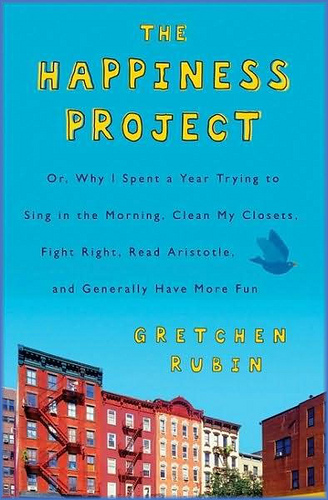For new readers to the blog, the beginning of 2011 was not easy for me. I lost my father and my beloved dog in short succession, and I found myself in a pretty low state. Scrabbling about for something … anything… that could help me feel better, I picked up The Happiness Project: Or, Why I Spent a Year Trying to Sing in the Morning, Clean My Closets, Fight Right, Read Aristotle, and Generally Have More Fun by Gretchen Rubin. And somewhat surprisingly, it helped.
In the Happiness Project, Gretchen Rubin sets out to spend a year increasing her personal happiness. Being a Yale graduate and a former lawyer (and oh, could I relate), she started with the only logical path: research. Followed by lots of notecards and to-do lists. And a STRATEGY. Each month Rubin focused on one step or building block to her happiness, beginning with energy and moving through marriage, family, career, fun, and spirituality, among others. Each month she created “resolutions” or habits she hoped to build, and the successive months built upon the work she had done the previous month. Through the book, she described not only her own personal happiness quest, but also snippets of her research, her methodology, and stories she got from readers of her companion blog (set up during The “career” month.)
Now, I will say that the book is not without its flaws. The genre of stunt nonfiction (“I spent a year doing xyz”, possibly most famous in Julie Powell’s Julie/Julia project, which was turned first into a book and then into a movie
) is growing a little tired. How many of us plebes have an entire year to devote to a specific and esoteric pursuit? Also Rubin, with her ivy league education and Upper Westside Manhattan existence hardly seems like someone who should be happiness-challenged. Still, Rubin candidly addresses both of these issuess, and admits that her journey may not be everyone’s cup of tea.
Despite the faults, I found this book to be inspiring. The idea of happiness as something measurable and achievable was one that resonated with me, particularly this spring. And the advice Rubin gives about achieving happiness is fairly universal and also concrete. “Get more sleep.” “Build connections.” And reading about the effects her project had on her life inspired me to seek happiness as a personal goal in my own way. Of course, not all of Rubin’s specific goals are applicable to me. I’m far to anxious to read disaster narratives (part of the “contemplating eternity” month), and keeping an empty shelf in my house is just not an efficient use of space. Even her methodologies don’t really work for me. I fully admit that I decided to embark upon my own happiness project, came up with resolutions, printed up charts, and promptly ignored it after a week. Apparently I’m not a chart kind of girl. I kind of knew that. One of the pieces of advice that Rubin gives is “What’s fun for other people may not be fun for you — and vice versa.” Wise words to remember.
Still, the book is still affecting me and making me think. In addition to her personal resolutions and goals, Rubin comes up with some “Secrets of Adulthood” and “Splendid Truths” which do seem to have a broad application. When I’m making choices, I think about how the choices will make me happy or not. I remember that even when I feel like holing up at home (which does, sometimes, make me happy), I’m better served by building connections and relationships, even as an introvert. I remember that my environment does affect my mood, and that if I have a headache, an ibuprofen really will help (a “secret of adulthood.”) I think about how my attitude is affecting my family (“One of the best ways to make yourself happy is to make other people happy; One of the best ways to make other people happy is to be happy yourself.”) and I try to stop and notice those moments that are what happiness is made of.
The Happiness Project didn’t fix my grief. It’s not literary prozac. I’m still sad a lot. But it helped me look for my inner core of happiness. To choose the sunshine. To let springtime in.



So excited to have found your site! Look forward to more reviews and recipe inspiration. Thank you!
Gretchen was a classmate of mine at Yale, and we lived in the same residential college. I didn’t know her well, but I knew her enough to have been surprised when this book came out. Engineering happiness wasn’t something I would have predicted of her.
However, I agree completely with the idea that we are largely responsible for our own happiness, and that every one of us can identify and incorporate into our lives specific actions and habits that make us happy. Mine: listening to REALLY LOUD MUSIC in the car with the windows down and singing along at the top of my lungs. Completely incompatible with my husband, which is why when I’m upset I occasionally leave the house and go for a drive alone. A girl needs her fix.
Thanks for a great book review. I’ve seen this book around, but now I think I’m going to put it on my library list.
Well, you know I share the love for this book. It really made me think, too. While I haven’t embarked on my own happiness project (largely because I made a promise to myself last year to try to reduce the amount of lists and resolutions in my life– they were becoming overwhelming), I have really taken to heart a lot of the lessons Rubin learned. I’m inspired by the idea that little things can really increase not only my happiness, but my family’s happiness.
I applaud you for both the book review – and for letting the sunshine in. Keep after it!